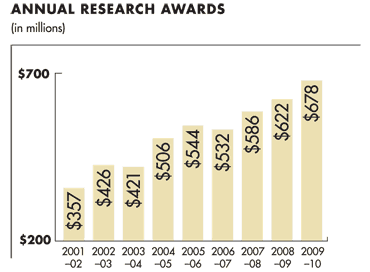The vision: Innovation
Building on the interdisciplinary strengths of its faculty, UC Davis will promote a collaborative environment that spurs innovations in learning and research by discovering ideas that take shape at the frontiers and intersections of academic disciplines.
By capitalizing on the university’s strength in cross-disciplinary collaboration, UC Davis faculty and staff and student researchers are continually pushing themselves to discover, develop and license groundbreaking innovative technologies and ideas. UC Davis also is driving those innovations out of the classrooms and laboratories and into the marketplace—generating licensing revenues—through its centers, institutes and programs, such as the Center for Science and Innovation Studies, Center for Entrepreneurship and the Office of Research.
2010 Highlights in innovation:
The U.S. Department of Agriculture honored UC Davis plant pathologists for their lead role in developing a national network designed to protect plants against significant pests and diseases that could be introduced accidentally or by bioterrorism.
Engineering Professor Andy Frank, regarded as the father of the plug-in hybrid by automotive publishing company Edmunds, was presented with one of the country’s first plug-in hybrid Chevrolet Volts.
Two research teams led by College of Biological Sciences professors Stephen Kowalczykowski and Wolf-Dietrich Heyer discovered a key step in understanding the origins of familial breast cancer.
Biomedical engineer Alexander Revzin and colleagues in the College of Engineering developed a “lab on a chip” device that could make HIV testing more affordable in the developing world and other resource-poor areas.
Research
During the 2009-10 fiscal year, UC Davis received more than $678 million in research funds—a record for the campus and double what it was a decade ago.
“UC Davis continues to build on its strengths and create new opportunities to advance our quality of life, whether in biomedical research, agriculture, the environment or engineering,” said Chancellor Linda Katehi, who has made expansion of UC Davis’ research enterprise a key goal in her vision for the campus.
The university’s research enterprise was evaluated in the past year by faculty committees and the former Washington Advisory Group, led by Erich Bloch, a former director of the National Science Foundation. The recommendations produced will help build on existing strengths, expand basic research and forge collaborations with industry that help move UC Davis research findings from the laboratory to the marketplace for the betterment of humankind.
Examples of grants awarded to UC Davis faculty in the past year include $75 million from the U.S. Agency for International Development, awarded over five years, to establish a network to detect and prevent diseases moving from wildlife to people; $125,000 from the NFL (National Football League) Charities for research on new ways to repair knee injuries; and nearly $12 million during two years to support a range of studies at the UC Davis MIND Institute on the causes of autism.
Almost two-thirds of the total—$437 million—came from the federal government, up from $329 million last year. The largest source was the U.S. Department of Health and Human Services, which provided $258 million, an increase of more than $60 million compared to the previous year. The National Science Foundation awarded $64 million and the U.S. Department of Agriculture provided $36 million. About $104 million was awarded under the American Recovery and Reinvestment Act.
The state of California gave $60 million, a decrease from $113 million given last year. Funding from other government sources— e.g., states other than California, cities and counties—totaled $20 million in fiscal year 2009-10.
Funding from charities and foundations totaled almost $36 million. Business provided $44 million, an increase from the previous year, while other institutions of higher education awarded $36 million, principally as subcontracts on other grants. Other UC campuses and the Office of the President provided $23 million.
The 2009-10 UC Davis research fund total includes grants and contracts, including grants from philanthropic foundations, awarded to the university to support research. It does not include private gifts, which are reported separately.


